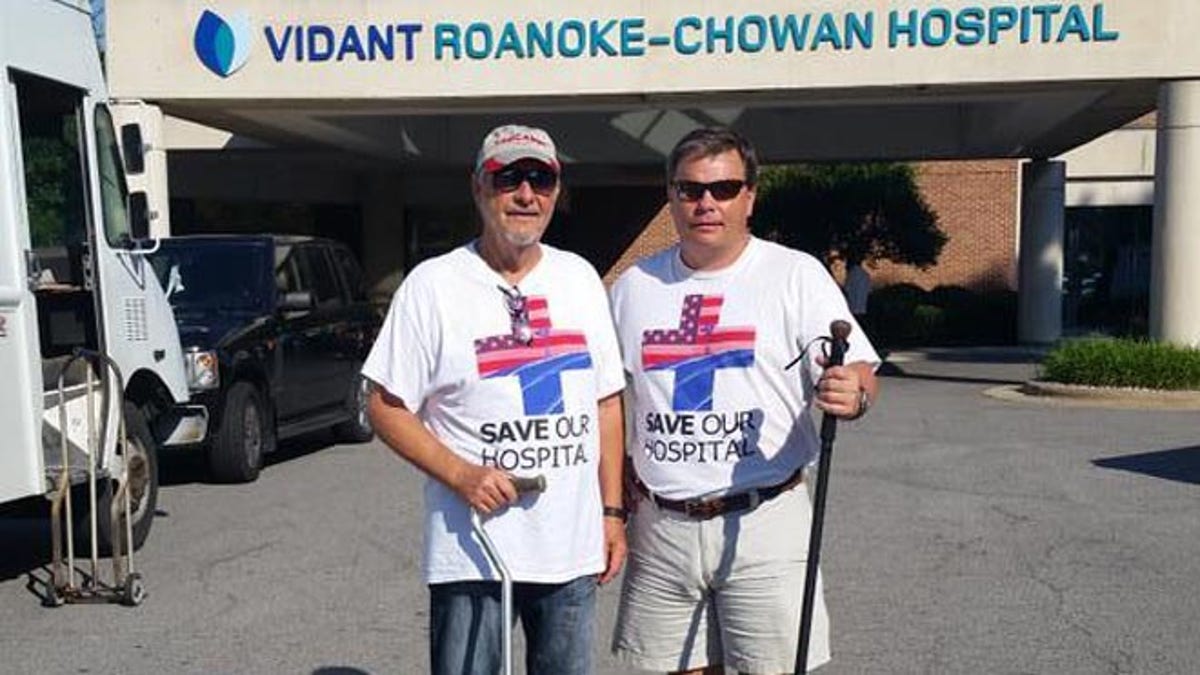
July 17, 2014: Bellhaven (N.C.) Mayor Adam O'Neal (R) in Virginia with unidentified companion during his 273-mile trek to Washington. (Stories of America)
A North Carolina mayor on Sunday was just a few miles away from finishing his 273-mile walk to Washington to draw attention to the closing of his small town’s local hospital and the plights of other rural facilities caught in financial bind created largely by ObamaCare, a changing economy and less federal funding.
“We’re almost there,” Belhaven Mayor Adam O’Neal, a Republican, said as he reached northern Virginia ahead of an approaching thunderstorm. “We’re going to make it.”
The mayor and others argue that an increasing number of small, rural hospitals have been shuttered since ObamaCare was signed into law in 2012.
Still, O'Neal is equally focused on bringing attention to what he considers Department of Health and Human Services and Justice Department failures leading to the closure of Belhaven’s Vidant Pungo Hospital.
“They let our hospital close,” he told FoxNews.com on Sunday. “Nobody is helping our people.”
He argues that closing the hospital, which receives federal funds, is a violation of the 1964 Civil Rights Act because the closure disproportionately impacts poor black people.
However, HHS is now investigating the possible violation, the mayor said.
O’Neal also thinks hospital owner Vidant Health failed to fulfill the terms of mediation required by the Justice Department and that the agency did not follow up on the agreement.
Still, he argues the turning point was after the hospital closed July 1, when a 48-year-old local resident suffered a heart attack, then died waiting an hour for a helicopter to take her to the now-closest hospital, 75 miles away.
To be sure, the 49-bed hospital appears a likely candidate for closure.
Beyond getting less Medicaid and Medicare money and few subsidies under ObamaCare, the aging facility reportedly serves fewer than 20 patients a day.
Vidant declined Sunday to comment but recently told The Wall Street Journal that the hospital last year saw an average of just four patients daily and that admissions had dropped by 30 percent.
The company also released a statement just before the hospital was scheduled to close that stated the town’s accusations “only serve to disguise the fact that it has failed to fulfill its obligations as outlined by the mediation agreement.”
Vidant said in part that multiple failed attempts to contact Belhaven about the transition “made it apparent that the town knew that it did not have a plan.”
As an alternative to keeping the hospital open, Vidant has opened a clinic in the costal North Carolina town to serve the residents of Beaufort and Hyde counties, many of whom are poor and uninsured, and plans to open an urgent-care facility next year.
O’Neal and others argued that Vidant makes hundreds of millions in annual profits and that keeping open smaller facilities such as Pungo also turns a profit, just not as much as closing them and instead opening urgent-care facilities.
At least 14 rural hospitals have closed since last year, according to several reports.
They have been squeezed in large part by the increasing cost of health care, fewer patients allowed overnight stays, less subsidies under ObamaCare for helping the uninsured and the potential for cuts in Medicaid payments in the next fiscal year.
Along the way to Washington, O’Neal met in Richmond with Virginia Democratic Gov. Terry McAuliffe, who is dealing with similar issues and vowed to contact the White House for assistance.
The mayor also has a meeting Monday on Capitol Hill with North Carolina Rep. G.K. Butterfield and is tentatively scheduled to meet with fellow Democratic Reps. David Price, N.C., and Hank Johnson, Ga.
O’Neal’s argument that expanding Medicaid under ObamaCare could have prevented the hospital's closure puts him at odds with Republican leaders, considering North Carolina and 23 other states, all GOP-controlled and mostly southern, have refused Medicaid expansion.
A busload of Belhaven residents are also expected to arrive on Capitol Hill on Monday to talk to members of Congress and their staffers about the issue.




